UK to expel all Iranian diplomats over embassy attack
- Published
- comments
Foreign Secretary William Hague: "We require the immediate closure of the Iranian embassy in London"
The UK is to expel all Iranian diplomats following the storming of its embassy in Tehran, Foreign Secretary William Hague has announced.
He said he had ordered the immediate closure of the Iranian embassy in London.
Tuesday's attack by hundreds of protesters followed Britain's decision to impose further sanctions on Iran over its nuclear programme.
The sanctions led to Iran's parliament reducing diplomatic ties with the UK.
Mr Hague said he was demanding the immediate closure of the Iranian embassy in London, with all its staff to leave the UK within 48 hours.
"If any country makes it impossible for us to operate on their soil they cannot expect to have a functioning embassy here," Mr Hague told MPs, external.
He said there had been "some degree of regime consent" in the attacks on the embassy and on another UK diplomatic compound in Tehran.
He said all UK diplomatic staff in Tehran had been evacuated and the embassy closed.
Mr Hague said relations between the UK and Iran were now at their lowest level, but the UK was not severing relations with Tehran entirely.
Addressing parliament, Mr Hague said he was due to raise the matter at a meeting of the EU Foreign Affairs Council in Brussels.
"We will discuss these events and further action which needs to be taken in the light of Iran's continued pursuit of a nuclear weapons programme," he said.
Iran's foreign ministry called the British move "hasty", state TV reported, according to Reuters.
It said Iran would take "further appropriate action".
Also on Wednesday, Germany, France and the Netherlands announced they were recalling their ambassadors to Tehran for consultation and Norway said it was temporarily closing its embassy there as a precaution.
Italian Foreign Minister Giulio Terzi said the Iranian ambassador to Rome was being summoned to give guarantees of security for Italy's mission in Tehran.
Hundreds of protesters - whom Iran described as "students" - massed outside the embassy compound on Tuesday afternoon before scaling the walls and the gates, burning British flags and a car.
Another UK diplomatic compound in northern Tehran, known locally as Qolhak Garden, was also overrun and damaged.
Iran said it regretted the incident, which it described as "unacceptable behaviour by a small number of protesters".
Mr Hague said the majority of those taking part had been members of a regime-backed Basij militia group.
He said the private quarters of staff and the ambassador had been ransacked, the main embassy office set on fire and personal possessions belonging to UK diplomats stolen.
The US, EU and UN Security Council also condemned the attacks.
Turbulent history
Relations between the UK and the Islamic Republic of Iran have been fraught since the Iranian revolution in 1979.
Wednesday's move brings bilateral relations to their lowest level since 1989 when ties were broken over Iran's declaration of a "fatwa" (edict) to kill the author Salman Rushdie.
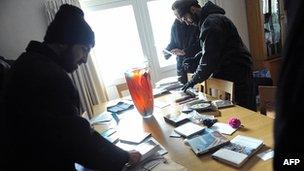
New pictures have emerged of offices at the British embassy being searched by protesters
Analysts have compared Tuesday's scenes in Tehran to the 1979 storming of the US embassy there. That ended with more than 50 US diplomats and staff being held hostage for more than 400 days.
The US and Iran have had no diplomatic ties since then - the Swiss embassy in Tehran serves as the protecting power for US interests in the country.
Last week the US, Canada and the UK announced new sanctions against Iran, including measures to restrict the activities of the Iranian central bank.
The UK said then it was severing all financial ties with Iran.
The move followed a report by the UN's nuclear watchdog (IAEA) that said Iran had carried out tests "relevant to the development of a nuclear device".
Iran denies the accusations, saying its nuclear programme is solely for peaceful purposes.
On Sunday, Iran's parliament voted by a large majority to downgrade diplomatic relations with the UK in response to the recent action.
- Published30 November 2011
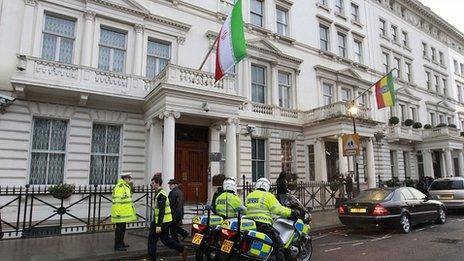
- Published30 November 2011
- Published30 November 2011
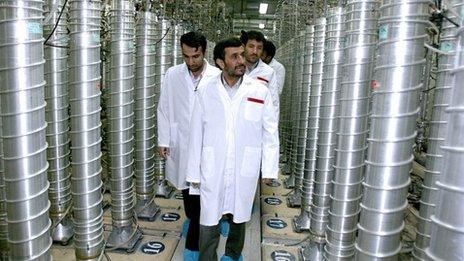
- Published30 November 2011
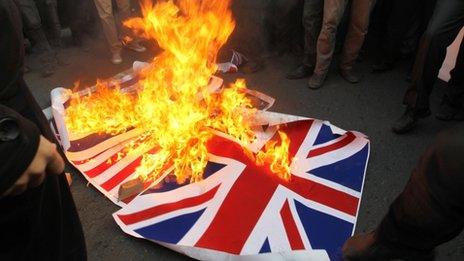
- Published30 November 2011
- Published25 November 2014
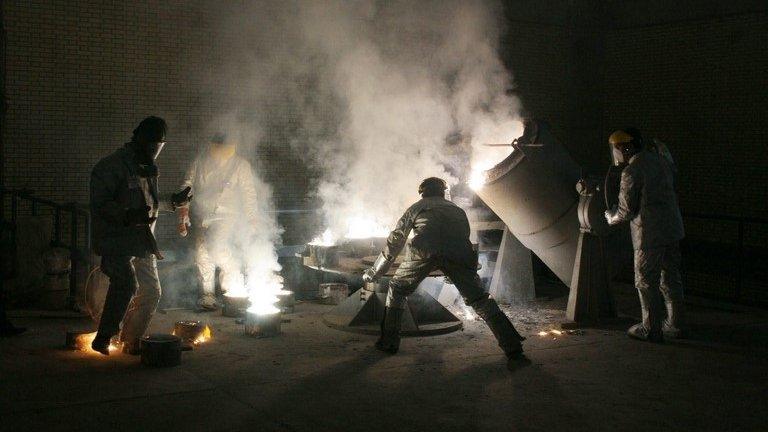
- Published29 November 2011